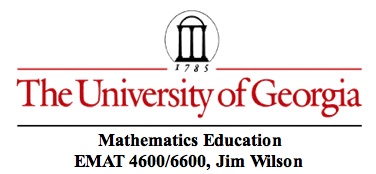

A man writes a check for d dollars and c cents. The clerk, in error, gave him c dollars and d cents. After spending 5 cents, the man finds the remaining money is twice the amount of the check. Determine the amounts.
We could represent the amount of the check as 100d + c and the amount the clerk gave him as 100c + d and determine an equation to be
2(100d + c) = (100c + d) - 5
Simplify: 200d + 2c = 100c + d - 5
199d + 5 = 98c
Now, c and d must be integers with both c and d less than 100. So the question becomes what is the smallest integer d that will result in an integer value for c ? We could klutz around with this equation but it might be a little easier to see if we consider that
199d = 196d + 3d = 2(98)d + 3d
So
Now we can see that 3d + 5 must be a multiple of 98. If 3d + 5 = (1)(98) we have
3d + 5 = 98 which means that d = 31 and therefore c = 62 + 1 = 63.
The check was $31.63.
Assessing that result, the clerk would have given out $63.31. After .05 was spent, the amount of money remaining was $63.26 which is 2 x $31.63. Confirmed -- almost. We still have to confirm that other values of d would not work.
Check
3d + 5 = (2)(98)
3d + 5 = (3)(98)
3d + 5 = (4)(98)The first two do not lead to an integer value of d; the third one gives a value of d > 100.
If 3d + 5 is a larger multiple of 98, then d would be more that 100 and so d = 31, c = 63 is the only solution.